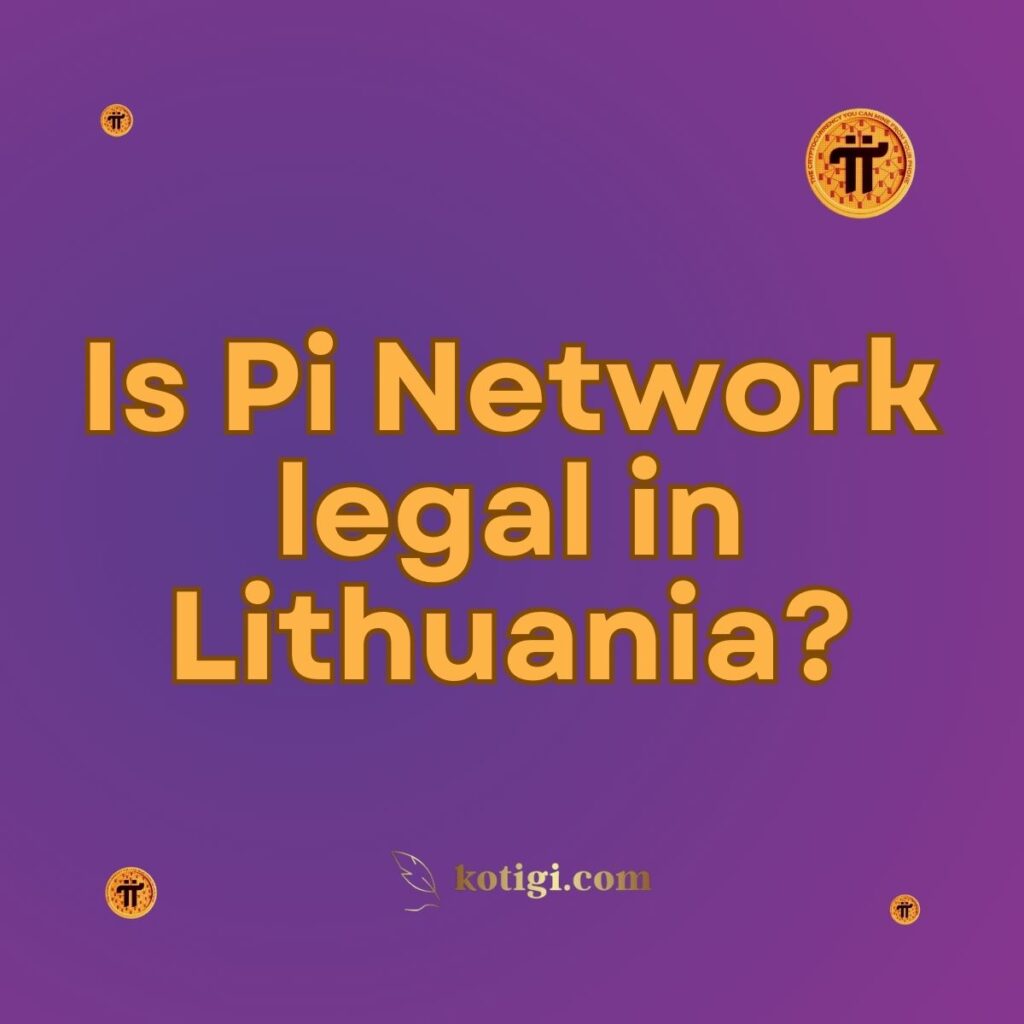
Is Pi Network legal in Lithuania?
Pi Network is legal in Lithuania, as the country does not currently have specific laws prohibiting the use of cryptocurrencies. However, like much of the European Union, Lithuania is working towards a clear regulatory framework for digital assets, making it essential for users to stay updated on future developments.
Introduction
As Pi Network continues to expand globally, many users in Lithuania are wondering about its legal status. While Lithuania is a progressive country in terms of fintech and blockchain adoption, the nation still lacks specific regulations targeting Pi Network or similar platforms. In this article, we’ll explore the current legal landscape for cryptocurrencies in Lithuania, Pi Network’s role, and what users should consider when participating in the platform.
Cryptocurrency Regulations in Lithuania
Overview of Lithuania’s Crypto-Friendly Stance
Lithuania is known for its openness to fintech innovations, including blockchain and cryptocurrencies. The country has earned a reputation as a hub for financial technology startups and is actively exploring ways to regulate and support the use of digital assets. However, there is no explicit legislation addressing Pi Network, as it operates in the same legal grey area as other cryptocurrencies.
Lithuania follows the broader European Union (EU) guidelines when it comes to cryptocurrency regulation, with the Bank of Lithuania issuing guidelines for digital assets. The government’s general approach is to encourage innovation while ensuring that financial stability is maintained.
European Union Influence
Lithuania’s cryptocurrency regulations are influenced by broader EU frameworks, particularly the upcoming Markets in Crypto-Assets (MiCA) regulation, which aims to establish a unified legal approach to crypto assets across EU member states. MiCA is expected to provide more legal clarity on the status of cryptocurrencies, including how they are taxed, traded, and regulated.
For now, Pi Network can operate freely in Lithuania, but users should keep an eye on upcoming EU-wide regulations that could affect how cryptocurrencies are treated in the country.
Taxation and Financial Regulations
Cryptocurrency as Taxable Assets
Lithuania, like many EU countries, classifies cryptocurrencies as assets. This means that any future profits gained from selling or trading Pi coins may be subject to taxation. While Pi coins are not yet tradeable on the open market, users should be prepared for possible tax obligations once the network fully transitions to its open mainnet and Pi coins acquire monetary value.
Lithuanian tax authorities expect users to report any profits from cryptocurrency transactions. For Pi Network participants, this means that any future gains should be declared and taxed according to existing capital gains laws.
Compliance with AML and KYC Laws
As part of the EU, Lithuania enforces anti-money laundering (AML) and know-your-customer (KYC) regulations for financial institutions. Although Pi Network itself does not currently require KYC for mining Pi, users will likely need to comply with these standards when exchanging or trading Pi coins in the future. Platforms that offer Pi coin exchanges or trading services will need to implement KYC processes to ensure compliance with Lithuanian and EU laws.
Pi Network’s Role in Lithuania’s Financial Ecosystem
Digital Innovation and Blockchain Growth
Lithuania’s fintech sector has been rapidly growing, and blockchain technology is playing an increasingly important role in this development. Pi Network, with its innovative approach to mobile mining and community validation, aligns with the country’s goals of fostering digital inclusion and technological advancement.
As more Lithuanians become interested in cryptocurrencies, platforms like Pi Network can help democratize access to digital assets. Its mobile-friendly mining process allows users to participate without needing expensive hardware, making it accessible to a broader audience.
Potential Business Applications
Lithuania’s vibrant tech scene and entrepreneurial spirit provide fertile ground for innovative blockchain projects. As Pi Network moves towards its open mainnet, there could be opportunities for local businesses to integrate Pi coins into their operations, either as a payment option or within loyalty and rewards programs. However, the legal and regulatory landscape will play a significant role in determining how quickly these opportunities can materialize.
Legal Considerations for Pi Network Users
Consumer Protection and Security Risks
While Pi Network is legal in Lithuania, users should be mindful of the risks involved in participating in an unregulated cryptocurrency platform. The lack of clear consumer protection laws for Pi Network users means that participants are exposed to potential risks, such as fraud or security breaches, without formal recourse.
Additionally, users should take standard security precautions, including enabling two-factor authentication (2FA) and securing their private keys, as any future trading or exchange of Pi coins may involve interactions with third-party platforms that could carry risks.
Future Regulatory Developments
As Lithuania continues to develop its fintech and cryptocurrency sectors, it is likely that more detailed regulations will emerge. These could affect how Pi Network and other decentralized platforms operate in the country. Lithuanian Pi Network participants should stay informed about potential legislative changes, especially those related to MiCA, which could provide clearer guidelines on how cryptocurrencies are governed within the EU.
Lithuania’s Progressive Approach to Blockchain
Government Support for Blockchain Initiatives
The Lithuanian government has demonstrated a strong interest in fostering blockchain innovation. The Ministry of Finance and the Bank of Lithuania have both supported initiatives that explore the potential uses of blockchain technology across different sectors. This progressive approach could benefit Pi Network users in the country by creating a favorable regulatory environment for the platform’s future growth.
Blockchain Sandbox and Startups
Lithuania is one of the few countries in the EU with a regulatory sandbox for fintech and blockchain startups. This sandbox allows companies to test innovative solutions in a controlled environment before they are fully regulated. Pi Network’s community-driven model could potentially benefit from this ecosystem if it explores opportunities to collaborate with local businesses and innovators in Lithuania.
Conclusion
Pi Network is currently legal in Lithuania, and the country’s crypto-friendly environment supports its operation. However, the lack of specific regulations for cryptocurrencies means that users should proceed with caution and stay informed about upcoming changes to the legal framework. As part of the EU, Lithuania is expected to adopt the MiCA regulation, which will bring more clarity to the status of digital assets, including Pi Network’s future operations.
For now, Pi Network offers an exciting opportunity for Lithuanian users to engage with blockchain technology in a relatively open market. However, it is essential for participants to remain aware of potential risks and be prepared for any future legal developments that may impact the platform.
Key Takeaways
- Legal Status: Pi Network is legal in Lithuania, but the country has not yet implemented specific regulations for cryptocurrencies.
- Government Stance: Lithuania is a blockchain-friendly nation that encourages fintech innovation, with an open approach to digital assets.
- EU Regulations: The future MiCA regulation is expected to provide more legal clarity for cryptocurrencies in Lithuania and across the European Union.
- Tax Considerations: Users may be subject to taxation on profits from Pi coins once they become tradeable.
- Business Opportunities: Pi Network could integrate with Lithuania’s growing tech sector, particularly in fintech and blockchain.





